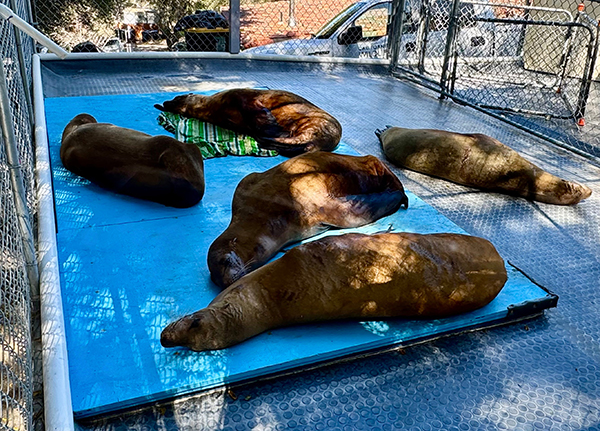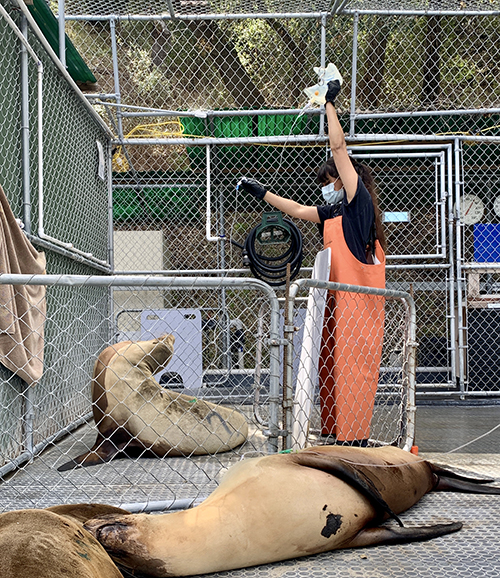Rehabilitating Adult California Sea Lions affected by Domoic Acid Toxicity
By Heather Henderson, Marine Mammal Program Manager
The California Wildlife Center’s marine mammal rehabilitation program turned 13 this year. During the 2013 “Unusual Mortality Event” affecting California Sea Lion pups (less than 1 year of age) we transitioned from a rescue and transport program to one that includes on-site rehabilitation of young Northern Elephant Seals and California Sea Lions. Each winter, spring, and early summer, the majority of rescued marine mammals in Malibu are early weaned or severely malnourished seals and sea lions.
Our team typically rescues fewer than twenty adult California Sea Lions each year. Most commonly, we see sea lions with predator wounds during the summer, and a few Leptospirosis cases popping up in the fall. This year alone, our team has performed 225 responses.
2025 has presented new challenges for our local pinnipeds, and the humans that care for them. On February 19, 2025, an adult sea lion was found stranded on a beach in Malibu, displaying signs of Domoic Acid (DA) Toxicity. Within the next week, reports of seizing sea lions flooded the rescue phone. By the beginning of March, affected marine mammals were showing up along the entire Southern California coastline. Reflecting on data from the past 10 years, this is the earliest and most severe event involving adult California Sea Lions affected by Domoic Acid Toxicity.
Adults historically were transported directly to our network partner for rehabilitative care. After rescuing two dozen adult California Sea Lions and transferring them to Marine Mammal Care Center LA (MMCCLA), it became clear they were also seeing a surge in intakes, and rehabilitation space was quickly running out. We had a choice, leave all ailing sea lions on the beach or immediately augment our enclosures to perform full-term rehabilitative care for DA affected sea lions. The timing was tough, as it aligned with the height of the Northern Elephant Seal pup strandingseason, but regardless of this fact, we chose the latter.
Within days, a sturdy cover was built to turn our pool enclosure into a safe space to house and care for adult California sea lions. Since adapting our space, three dozen adult female sea lions, severely affected by Domoic Acid Toxicity, have been brought into care and given a second chance at survival in an increasingly difficult wild world. Each adult remains in care for 3-4 weeks.
During week one, managing seizure activity and providing fluid therapy is top priority. This calms the body and helps flush out the toxins. During week two, additional nourishment and medication is administered with the goal of resuming self-feeding. Week three (and four when needed) are used to monitor overall health and behavior to determine if the individual is ready to return to their natural environment.
The last big event was in 2023. That year, CWC responded to 254 ailing marine mammals in Malibu. To date, we have responded to 267 animals. Each year presents new challenges, and we constantly work to rise to those challenges to assist the beautiful animals that we are fortunate to call our wild neighbors! How can you help? In Malibu, report marine mammals in distress by calling our rescue line at 310-924-7256. Never attempt to push an animal back into the water, feed or pour water on them. Keep dogs on a leash and do not let them approach.
A sturdy cover was built to turn our pool enclosure into a safe space for adult California Sea Lions
Stranding Coordinator, Alexis Sierra RVTg, provides fluid therapy for sea lions in care
Patient released back into the wild



